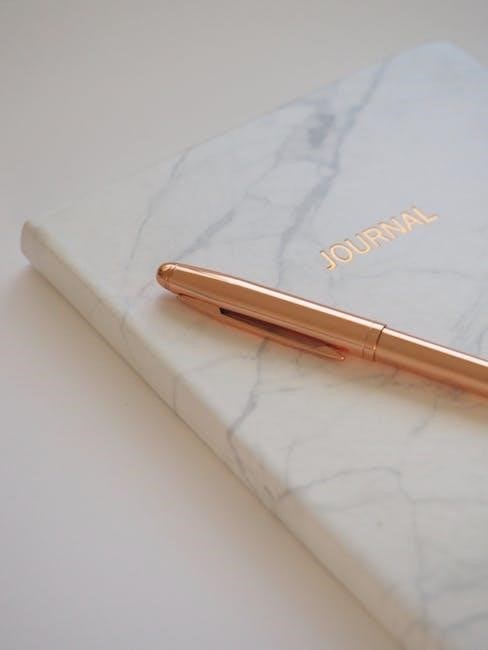dbt diary card pdf free
What is a DBT Diary Card?
A DBT Diary Card is a tool used in Dialectical Behavior Therapy to track daily emotions, behaviors, and skill use, aiding in self-monitoring and therapy progress.
Purpose and Benefits of Using a DBT Diary Card
The DBT Diary Card helps individuals track emotions, behaviors, and skill use, promoting self-awareness and accountability. It identifies patterns, monitors progress, and enhances therapy effectiveness by providing clear insights into emotional states and coping strategies, fostering personal growth and better decision-making in managing challenging situations.

Structure and Key Components of a DBT Diary Card
A DBT Diary Card typically includes sections for daily ratings of emotions and urges, skills used, and target behaviors. It often features a layout with columns for each day of the week, checkboxes for tracking skills, and spaces for notes and reflections, ensuring comprehensive and organized self-monitoring.
Types of DBT Diary Card Templates
Various DBT Diary Card templates are available, including adult, adolescent, parent, and RO-DBT versions, each tailored to specific needs and populations for effective tracking and therapy support.
Adult DBT Diary Card
An Adult DBT Diary Card is designed for individuals to track daily emotions, urges, and DBT skill usage. It typically includes sections for monitoring targets, rating emotional intensity, and noting skills used, helping adults identify patterns and progress in managing their behaviors and emotional responses effectively. Regular use enhances self-awareness and therapeutic outcomes.
Adolescent DBT Diary Card
An Adolescent DBT Diary Card is tailored for teens, focusing on tracking emotions, suicidal thoughts, self-harm urges, and substance use. It includes sections for rating emotional intensity, documenting skills used, and reflecting on triggers. This tool helps adolescents and their therapists identify patterns, improve coping strategies, and enhance emotional regulation, fostering a supportive environment for growth and recovery.
Parent DBT Diary Card
A Parent DBT Diary Card is designed to help parents monitor their child’s emotions, behaviors, and skill use. It includes sections for tracking triggers, emotional intensity, and effectiveness of skills used. This tool aids parents in supporting their child’s therapy process, fostering open communication, and reinforcing DBT strategies within the family environment to promote consistent growth and understanding.
RO-DBT Diary Card

The RO-DBT Diary Card is tailored for Radically Open Dialectical Behavior Therapy, focusing on social connection and emotional expression. It helps track rigid behaviors, emotional openness, and social interactions, encouraging individuals to balance self-control with flexibility. This card supports personal growth by addressing traits like overcontrolled personality patterns, fostering emotional awareness, and enhancing relationships through structured reflection and skill practice daily.

Key Sections of a DBT Diary Card
A DBT Diary Card includes sections for tracking targets and behaviors, rating emotions and urges, documenting skills used, and adding notes for reflection and progress monitoring daily.
Targets and Behaviors to Track
The diary card includes sections to monitor specific behaviors like self-harm, suicidal thoughts, and substance use, as well as positive actions. It helps track emotional intensity, urges, and skill use, providing insights into patterns and progress over time for effective therapy sessions and personal growth.
Emotions and Urges Rating Scale
The diary card uses a 0-5 scale to rate emotional intensity and urges, such as misery, anger, joy, and suicidal thoughts. This tool helps identify triggers and patterns, allowing individuals to monitor and manage their emotions more effectively, fostering greater self-awareness and emotional regulation skills over time.
Skills Used and Their Effectiveness
This section tracks DBT skills like mindfulness, distress tolerance, and emotional regulation. Users rate effectiveness on a scale, providing insights into which skills help manage emotions and reduce harmful behaviors. This feedback loop enhances skill mastery and personal growth, guiding individuals to refine their strategies and improve emotional resilience over time.
Additional Notes and Reflections
This section allows users to jot down extra thoughts, insights, or lessons learned throughout the day. It’s a space for reflecting on challenges, successes, or new strategies that worked well. These notes help identify patterns and deepen self-awareness, making it easier to discuss progress with a therapist and refine personal growth strategies. Regular reflection enhances self-understanding and therapy outcomes.

Where to Download Free DBT Diary Card PDFs
Free DBT Diary Card PDFs are available on official DBT websites, mental health platforms, and customizable template sources. They can be easily downloaded, printed, and personalized for use.
Official DBT Websites and Resources
Official DBT websites like Behavioral Tech and DBT Skills offer free, downloadable PDF diary cards. These resources are designed by professionals to align with therapy goals, ensuring authenticity and effectiveness. They provide structured formats for tracking emotions, behaviors, and skills, making them ideal for consistent use in DBT practice.

Online Marketplaces and Mental Health Platforms
Online platforms like Etsy and Psychology Today offer a variety of free and customizable DBT diary card PDFs. These resources are designed for easy download and use, catering to diverse needs. Many mental health websites also provide free templates, making it convenient to find a format that suits your preferences and therapy requirements.
Customizable Templates for Specific Needs
Customizable DBT diary card templates allow users to tailor sections to their specific needs, such as tracking particular skills or emotions. Many templates are adaptable for different age groups or situations, ensuring a personalized approach to therapy. This flexibility makes them ideal for individuals with unique requirements or those seeking a more focused tracking system.

How to Fill Out a DBT Diary Card
Filling out a DBT diary card involves tracking daily emotions, urges, and skills used, rating their intensity, and noting effectiveness. Consistency is key for progress and reflection.
Frequency of Use and Consistency
Consistency is key when filling out a DBT diary card. Aim to complete it daily or at least several times a week to track patterns and progress. Regular use helps identify emotional trends, skill effectiveness, and behavioral changes; Over time, this consistent practice enhances self-awareness and supports meaningful discussions with your therapist.

Step-by-Step Guide to Completing the Card
Start by noting the date and any target behaviors or emotions. Check off skills used daily and rate their effectiveness. Document urges and actions taken, ensuring honesty. Reflect on challenges and successes, adding notes for clarity. Review the card weekly to identify patterns and discuss insights with your therapist for guided growth.
Reviewing and Discussing with Your Therapist
Regularly review your diary card with your therapist to discuss progress, identify patterns, and adjust strategies. This collaboration helps deepen insights, refine skills, and address challenges. Use the card to highlight successes and areas needing improvement, ensuring a focused and productive session. Open dialogue enhances understanding of triggers and behaviors, fostering growth and refinement of DBT techniques.
Using the Diary Card for Progress Tracking
A DBT Diary Card tracks emotions and behaviors, helping identify triggers and refine strategies for progress in therapy over time.
Monitoring Skill Usage and Emotional Patterns
Tracking skills used daily helps identify which strategies work best for managing emotions. By rating emotions and urges, patterns emerge, allowing for targeted practice and improvement in emotional regulation over time.
Identifying Triggers and Problematic Behaviors
By documenting situations, emotions, and reactions, diary cards reveal triggers leading to harmful behaviors. This insight helps individuals and therapists address root causes, develop strategies to avoid or cope with triggers effectively, and reduce recurrence of problematic actions.
Adjusting Strategies Based on Insights
Regular review of diary cards enables individuals to refine their approaches, replacing ineffective strategies with more adaptive ones. This iterative process fosters personal growth, enhances skill mastery, and improves emotional resilience, leading to better overall well-being and long-term behavioral change.

Tips for Effective Use of a DBT Diary Card
Fill it consistently, practice mindfulness while writing, and be honest about emotions and behaviors. Regular reflection helps identify patterns and areas for improvement.
Customizing the Card to Suit Your Needs
Personalize your DBT Diary Card by adding specific skills or sections that align with your goals. Incorporate modules like mindfulness or distress tolerance, and include space for reflections. This tailored approach ensures the card remains relevant and effective for tracking progress and managing emotions.
Practicing Mindfulness While Filling It Out
Approach your DBT Diary Card with mindfulness by focusing on the present moment. Observe your thoughts and emotions without judgment, ensuring accuracy and clarity. This practice enhances self-awareness and helps integrate DBT skills into daily life, fostering a nonjudgmental stance and promoting emotional regulation.
Being Honest and Nonjudgmental in Entries
Being honest and nonjudgmental when filling out your DBT Diary Card is crucial for effective therapy. Record your thoughts, emotions, and behaviors without self-criticism, allowing for authentic reflection and growth. This approach helps identify patterns and triggers, enabling targeted skill development and fostering a compassionate relationship with yourself.

A DBT Diary Card is a powerful tool for tracking emotions, urges, and skills, enhancing self-awareness and supporting therapy progress and personal growth effectively.
Final Thoughts on the Importance of DBT Diary Cards
The DBT Diary Card is an essential tool for monitoring emotions, urges, and behaviors, aiding individuals in identifying patterns and triggers. By tracking daily experiences, it enhances self-awareness and communication with therapists, fostering accountability and consistency. Customizable to meet specific needs, it provides a clear visual of progress, empowering users to actively engage in their therapy journey and take ownership of their mental health, leading to long-term emotional resilience and well-being.
Encouragement to Continue Using the Tool
Consistently using a DBT Diary Card fosters accountability and insight into your emotional journey. It’s a simple yet powerful practice that helps you stay connected to your goals and progress. Remember, every entry is a step toward healing and self-improvement. Be patient with yourself, and celebrate small victories along the way—this tool is your ally in building a stronger, more resilient you.
